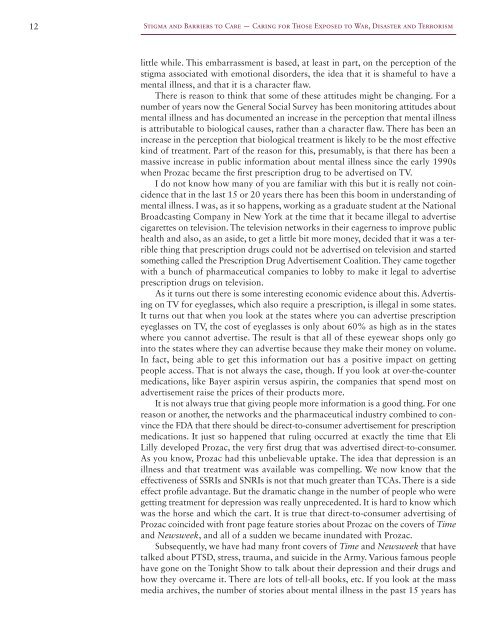stigma and barriers to care - Uniformed Services University of the ...
stigma and barriers to care - Uniformed Services University of the ...
stigma and barriers to care - Uniformed Services University of the ...
You also want an ePaper? Increase the reach of your titles
YUMPU automatically turns print PDFs into web optimized ePapers that Google loves.
12<br />
Stigma <strong>and</strong> Barriers <strong>to</strong> Care — Caring for Those Exposed <strong>to</strong> War, Disaster <strong>and</strong> Terrorism<br />
little while. This embarrassment is based, at least in part, on <strong>the</strong> perception <strong>of</strong> <strong>the</strong><br />
<strong>stigma</strong> associated with emotional disorders, <strong>the</strong> idea that it is shameful <strong>to</strong> have a<br />
mental illness, <strong>and</strong> that it is a character flaw.<br />
There is reason <strong>to</strong> think that some <strong>of</strong> <strong>the</strong>se attitudes might be changing. For a<br />
number <strong>of</strong> years now <strong>the</strong> General Social Survey has been moni<strong>to</strong>ring attitudes about<br />
mental illness <strong>and</strong> has documented an increase in <strong>the</strong> perception that mental illness<br />
is attributable <strong>to</strong> biological causes, ra<strong>the</strong>r than a character flaw. There has been an<br />
increase in <strong>the</strong> perception that biological treatment is likely <strong>to</strong> be <strong>the</strong> most effective<br />
kind <strong>of</strong> treatment. Part <strong>of</strong> <strong>the</strong> reason for this, presumably, is that <strong>the</strong>re has been a<br />
massive increase in public information about mental illness since <strong>the</strong> early 1990s<br />
when Prozac became <strong>the</strong> first prescription drug <strong>to</strong> be advertised on TV.<br />
I do not know how many <strong>of</strong> you are familiar with this but it is really not coincidence<br />
that in <strong>the</strong> last 15 or 20 years <strong>the</strong>re has been this boom in underst<strong>and</strong>ing <strong>of</strong><br />
mental illness. I was, as it so happens, working as a graduate student at <strong>the</strong> National<br />
Broadcasting Company in New York at <strong>the</strong> time that it became illegal <strong>to</strong> advertise<br />
cigarettes on television. The television networks in <strong>the</strong>ir eagerness <strong>to</strong> improve public<br />
health <strong>and</strong> also, as an aside, <strong>to</strong> get a little bit more money, decided that it was a terrible<br />
thing that prescription drugs could not be advertised on television <strong>and</strong> started<br />
something called <strong>the</strong> Prescription Drug Advertisement Coalition. They came <strong>to</strong>ge<strong>the</strong>r<br />
with a bunch <strong>of</strong> pharmaceutical companies <strong>to</strong> lobby <strong>to</strong> make it legal <strong>to</strong> advertise<br />
prescription drugs on television.<br />
As it turns out <strong>the</strong>re is some interesting economic evidence about this. Advertising<br />
on TV for eyeglasses, which also require a prescription, is illegal in some states.<br />
It turns out that when you look at <strong>the</strong> states where you can advertise prescription<br />
eyeglasses on TV, <strong>the</strong> cost <strong>of</strong> eyeglasses is only about 60% as high as in <strong>the</strong> states<br />
where you cannot advertise. The result is that all <strong>of</strong> <strong>the</strong>se eyewear shops only go<br />
in<strong>to</strong> <strong>the</strong> states where <strong>the</strong>y can advertise because <strong>the</strong>y make <strong>the</strong>ir money on volume.<br />
In fact, being able <strong>to</strong> get this information out has a positive impact on getting<br />
people access. That is not always <strong>the</strong> case, though. If you look at over-<strong>the</strong>-counter<br />
medications, like Bayer aspirin versus aspirin, <strong>the</strong> companies that spend most on<br />
advertisement raise <strong>the</strong> prices <strong>of</strong> <strong>the</strong>ir products more.<br />
It is not always true that giving people more information is a good thing. For one<br />
reason or ano<strong>the</strong>r, <strong>the</strong> networks <strong>and</strong> <strong>the</strong> pharmaceutical industry combined <strong>to</strong> convince<br />
<strong>the</strong> FDA that <strong>the</strong>re should be direct-<strong>to</strong>-consumer advertisement for prescription<br />
medications. It just so happened that ruling occurred at exactly <strong>the</strong> time that Eli<br />
Lilly developed Prozac, <strong>the</strong> very first drug that was advertised direct-<strong>to</strong>-consumer.<br />
As you know, Prozac had this unbelievable uptake. The idea that depression is an<br />
illness <strong>and</strong> that treatment was available was compelling. We now know that <strong>the</strong><br />
effectiveness <strong>of</strong> SSRIs <strong>and</strong> SNRIs is not that much greater than TCAs. There is a side<br />
effect pr<strong>of</strong>ile advantage. But <strong>the</strong> dramatic change in <strong>the</strong> number <strong>of</strong> people who were<br />
getting treatment for depression was really unprecedented. It is hard <strong>to</strong> know which<br />
was <strong>the</strong> horse <strong>and</strong> which <strong>the</strong> cart. It is true that direct-<strong>to</strong>-consumer advertising <strong>of</strong><br />
Prozac coincided with front page feature s<strong>to</strong>ries about Prozac on <strong>the</strong> covers <strong>of</strong> Time<br />
<strong>and</strong> Newsweek, <strong>and</strong> all <strong>of</strong> a sudden we became inundated with Prozac.<br />
Subsequently, we have had many front covers <strong>of</strong> Time <strong>and</strong> Newsweek that have<br />
talked about PTSD, stress, trauma, <strong>and</strong> suicide in <strong>the</strong> Army. Various famous people<br />
have gone on <strong>the</strong> Tonight Show <strong>to</strong> talk about <strong>the</strong>ir depression <strong>and</strong> <strong>the</strong>ir drugs <strong>and</strong><br />
how <strong>the</strong>y overcame it. There are lots <strong>of</strong> tell-all books, etc. If you look at <strong>the</strong> mass<br />
media archives, <strong>the</strong> number <strong>of</strong> s<strong>to</strong>ries about mental illness in <strong>the</strong> past 15 years has




